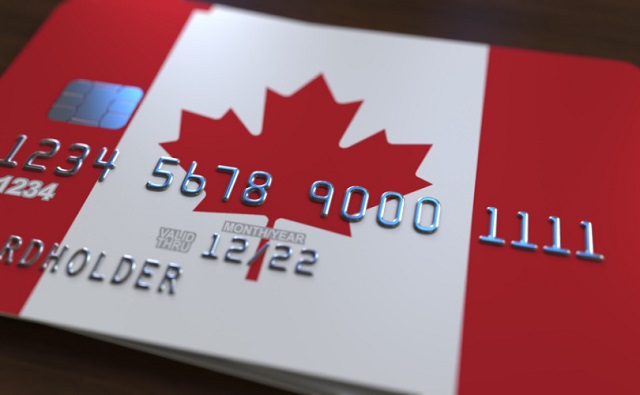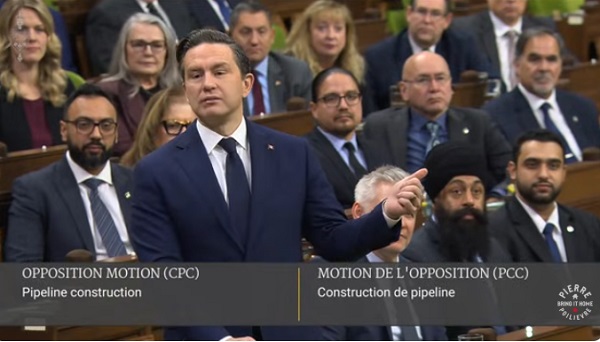Economy
Taxpayer watchdog slams Trudeau gov’t for increasing debt ceiling: ‘Put down the credit card’

From LifeSiteNews
Canadian Finance Minister Chrystia Freeland authorized an additional $73 billion in borrowing this fiscal year.
After Canadian Finance Minister Chrystia Freeland gave herself and the government the authority to borrow an additional $73 billion this fiscal year, the head of the nation’s leading taxpayer watchdog group said the federal government needs to “put down the credit card” and return to common-sense spending.
Freeland, as per a February 15 cabinet order made under the Financial Administration Act, allowed the extra borrowing to take place.
The government has set “$517 billion to be the maximum aggregate principal amount of money that may be borrowed” before April 1. Before this cabinet order, however, the maximum amount was $444 billion.
Despite Freeland claiming that the increase in borrowing is “in no way a blank cheque,” Canadian Taxpayers Federation federal director Franco Terrazzano said the borrowing needs to end.
“The Trudeau government needs to put down the credit card and pick up some scissors,” Terrazzano told LifeSiteNews.
“The government should be cutting spending and balancing the budget, not racking up more debt for years to come.”
In 2021, Canada’s Parliament raised the federal debt borrowing amount by a whopping 56% under the Borrowing Authority Act. The amount went from $1.168 trillion to $1.831 trillion.
“What it does is set a ceiling for how much the government can spend,” Freeland said at the time.
Terrazzano told LifeSiteNews that the Trudeau government should be cutting spending and balancing the budget, not racking up more debt for years to come.
“More debt means more money wasted on interest charges and less room to cut taxes,” he noted.
Terrazzano observed that in the coming year the Trudeau government will be spending “more money on debt interest charges than it sends to the provinces in health transfers.”
“In a handful of years, every penny collected from the GST (Goods and Service Tax) will go toward paying interest on the debt,” he noted.
Under Prime Minister Justin Trudeau, due to excessive COVID money printing, inflation has skyrocketed.
Last month, LifeSiteNews reported that fast-rising food costs in Canada have led to many people feeling a sense of “hopelessness and desperation” with nowhere to turn for help, according to the Canadian government’s own National Advisory Council on Poverty.
Last year, the Bank of Canada acknowledged that Trudeau’s federal “climate change” programs, which have been deemed “extreme” by some provincial leaders, are indeed helping to fuel inflation.
Terrazzano told LifeSiteNews that Trudeau should “completely scrap his carbon tax,” which is making everything more expensive.
Conservatives blast increased debt
Conservative Party of Canada (CPC) MPs have been critical of the raised debt ceiling. “You’re simply saying, ‘Give me a blank cheque and then trust me,’” MP Ed Fast said.
Freeland claimed that the “characterization of the borrowing authority limit as a blank cheque is simply false.”
CPC leader Pierre Poilievre recently asked, “Is there a dollar figure to which she would limit the debt?”
She replied that the government is “mindful that limits exist.”
During a February 13 Senate national finance committee meeting, Budget Officer Yves Giroux noted how Trudeau’s cabinet plans in terms of spending are not clear.
“We don’t know exactly what the government plans on spending or doing in terms of new spending or potential spending,” he said when asked by Senator Elizabeth Marshall if the new borrowing limits are “still realistic.”
Marshall added, “As it stands now, do you think it looks reasonable?”
“It looks sufficient, but the government always wants to give itself some room to maneuver in case there are unforeseen events that require borrowing on short notice,” Giroux replied.
A report from September 5, 2023, by Statistics Canada shows food prices are rising faster than headline inflation at a rate of between 10% and 18% per year.
According to a recent Statistics Canada survey of supermarket prices, Canadians are paying 12% more for carrots, 14% more for hamburger (ground meat), and 27% more for baby formula.
Business
Canada Can Finally Profit From LNG If Ottawa Stops Dragging Its Feet

From the Frontier Centre for Public Policy
By Ian Madsen
Canada’s growing LNG exports are opening global markets and reducing dependence on U.S. prices, if Ottawa allows the pipelines and export facilities needed to reach those markets
Canada’s LNG advantage is clear, but federal bottlenecks still risk turning a rare opening into another missed opportunity
Canada is finally in a position to profit from global LNG demand. But that opportunity will slip away unless Ottawa supports the pipelines and export capacity needed to reach those markets.
Most major LNG and pipeline projects still need federal impact assessments and approvals, which means Ottawa can delay or block them even when provincial and Indigenous governments are onside. Several major projects are already moving ahead, which makes Ottawa’s role even more important.
The Ksi Lisims floating liquefaction and export facility near Prince Rupert, British Columbia, along with the LNG Canada terminal at Kitimat, B.C., Cedar LNG and a likely expansion of LNG Canada, are all increasing Canada’s export capacity. For the first time, Canada will be able to sell natural gas to overseas buyers instead of relying solely on the U.S. market and its lower prices.
These projects give the northeast B.C. and northwest Alberta Montney region a long-needed outlet for its natural gas. Horizontal drilling and hydraulic fracturing made it possible to tap these reserves at scale. Until 2025, producers had no choice but to sell into the saturated U.S. market at whatever price American buyers offered. Gaining access to world markets marks one of the most significant changes for an industry long tied to U.S. pricing.
According to an International Gas Union report, “Global liquefied natural gas (LNG) trade grew by 2.4 per cent in 2024 to 411.24 million tonnes, connecting 22 exporting markets with 48 importing markets.” LNG still represents a small share of global natural gas production, but it opens the door to buyers willing to pay more than U.S. markets.
LNG Canada is expected to export a meaningful share of Canada’s natural gas when fully operational. Statistics Canada reports that Canada already contributes to global LNG exports, and that contribution is poised to rise as new facilities come online.
Higher returns have encouraged more development in the Montney region, which produces more than half of Canada’s natural gas. A growing share now goes directly to LNG Canada.
Canadian LNG projects have lower estimated break-even costs than several U.S. or Mexican facilities. That gives Canada a cost advantage in Asia, where LNG demand continues to grow.
Asian LNG prices are higher because major buyers such as Japan and South Korea lack domestic natural gas and rely heavily on imports tied to global price benchmarks. In June 2025, LNG in East Asia sold well above Canadian break-even levels. This price difference, combined with Canada’s competitive costs, gives exporters strong margins compared with sales into North American markets.
The International Energy Agency expects global LNG exports to rise significantly by 2030 as Europe replaces Russian pipeline gas and Asian economies increase their LNG use. Canada is entering the global market at the right time, which strengthens the case for expanding LNG capacity.
As Canadian and U.S. LNG exports grow, North American supply will tighten and local prices will rise. Higher domestic prices will raise revenues and shrink the discount that drains billions from Canada’s economy.
Canada loses more than $20 billion a year because of an estimated $20-per-barrel discount on oil and about $2 per gigajoule on natural gas, according to the Frontier Centre for Public Policy’s energy discount tracker. Those losses appear directly in public budgets. Higher natural gas revenues help fund provincial services, health care, infrastructure and Indigenous revenue-sharing agreements that rely on resource income.
Canada is already seeing early gains from selling more natural gas into global markets. Government support for more pipelines and LNG export capacity would build on those gains and lift GDP and incomes. Ottawa’s job is straightforward. Let the industry reach the markets willing to pay.
Ian Madsen is a senior policy analyst at the Frontier Centre for Public Policy.
Economy
Affordable housing out of reach everywhere in Canada

From the Fraser Institute
By Steven Globerman, Joel Emes and Austin Thompson
According to our new study, in 2023 (the latest year of comparable data), typical homes on the market were unaffordable for families earning the local median income in every major Canadian city
The dream of homeownership is alive, but not well. Nearly nine in ten young Canadians (aged 18-29) aspire to own a home—but share a similar worry about the current state of housing in Canada.
Of course, those worries are justified. According to our new study, in 2023 (the latest year of comparable data), typical homes on the market were unaffordable for families earning the local median income in every major Canadian city. It’s not just Vancouver and Toronto—housing affordability has eroded nationwide.
Aspiring homeowners face two distinct challenges—saving enough for a downpayment and keeping up with mortgage payments. Both have become harder in recent years.
For example, in 2014, across 36 of Canada’s largest cities, a 20 per cent downpayment for a typical home—detached house, townhouse, condo—cost the equivalent of 14.1 months (on average) of after-tax income for families earning the median income. By 2023, that figure had grown to 22.0 months—a 56 per cent increase. During the same period for those same families, a mortgage payment for a typical home increased (as a share of after-tax incomes) from 29.9 per cent to 56.6 per cent.
No major city has been spared. Between 2014 and 2023, the price of a typical home rose faster than the growth of median after-tax family income in 32 out of 36 of Canada’s largest cities. And in all 36 cities, the monthly mortgage payment on a typical home grew (again, as a share of median after-tax family income), reflecting rising house prices and higher mortgage rates.
While the housing affordability crisis is national in scope, the challenge differs between cities.
In 2023, a median-income-earning family in Fredericton, the most affordable large city for homeownership in Canada, had save the equivalent of 10.6 months of after-tax income ($56,240) for a 20 per cent downpayment on a typical home—and the monthly mortgage payment ($1,445) required 27.2 per cent of that family’s after-tax income. Meanwhile, a median-income-earning family in Vancouver, Canada’s least affordable city, had to spend the equivalent of 43.7 months of after-tax income ($235,520) for a 20 per cent downpayment on a typical home with a monthly mortgage ($6,052) that required 112.3 per cent of its after-tax income—a financial impossibility unless the family could rely on support from family or friends.
The financial barriers to homeownership are clearly greater in Vancouver. But, crucially, neither city is truly “affordable.” In Fredericton and Vancouver, as in every other major Canadian city, buying a typical home with the median income produces a debt burden beyond what’s advisable. Recent house price declines in cities such as Vancouver and Toronto have provided some relief, but homeownership remains far beyond the reach of many families—and a sharp slowdown in homebuilding threatens to limit further gains in affordability.
For families priced out of homeownership, renting doesn’t offer much relief, as rent affordability has also declined in nearly every city. In 2014, rental rates for the median-priced rental unit required 19.8 per cent of median after-tax family income, on average across major cities. By 2023, that figure had risen to 23.5 per cent. And in the least affordable cities for renters, Toronto and Vancouver, a median-priced rental required more than 30 per cent of median after-tax family income. That’s a heavy burden for Canada’s renters who typically earn less than homeowners. It’s also an added financial barrier to homeownership— many Canadian families rent for years before buying their first home, and higher rents make it harder to save for a downpayment.
In light of these realities, Canadians should ask—why have house prices and rental rates outpaced income growth?
Poor public policy has played a key role. Local regulations, lengthy municipal approval processes, and costly taxes and fees all combine to hinder housing development. And the federal government allowed a historic surge in immigration that greatly outpaced new home construction. It’s simple supply and demand—when more people chase a limited (and restricted) supply of homes, prices rise. Meanwhile, after-tax incomes aren’t keeping pace, as government policies that discourage investment and economic growth also discourage wage growth.
Canadians still want to own homes, but a decade of deteriorating affordability has made that a distant prospect for many families. Reversing the trend will require accelerated homebuilding, better-paced immigration and policies that grow wages while limiting tax bills for Canadians—changes governments routinely promise but rarely deliver.
-

 National18 hours ago
National18 hours agoLiberal bill “targets Christians” by removing religious exemption in hate-speech law
-

 Business2 days ago
Business2 days agoThe EU Insists Its X Fine Isn’t About Censorship. Here’s Why It Is.
-

 Business1 day ago
Business1 day agoCanada invests $34 million in Chinese drones now considered to be ‘high security risks’
-

 Bruce Dowbiggin2 days ago
Bruce Dowbiggin2 days agoWayne Gretzky’s Terrible, Awful Week.. And Soccer/ Football.
-

 Business14 hours ago
Business14 hours agoLooks like the Liberals don’t support their own Pipeline MOU
-

 Economy1 day ago
Economy1 day agoAffordable housing out of reach everywhere in Canada
-

 Health2 days ago
Health2 days agoCDC Vaccine Panel Votes to End Universal Hep B Vaccine for Newborns
-

 Business1 day ago
Business1 day agoThe Climate-Risk Industrial Complex and the Manufactured Insurance Crisis







